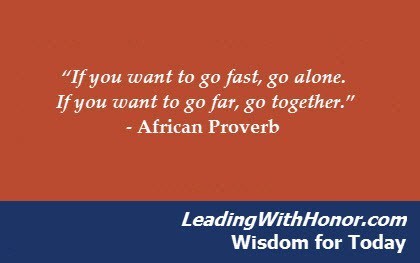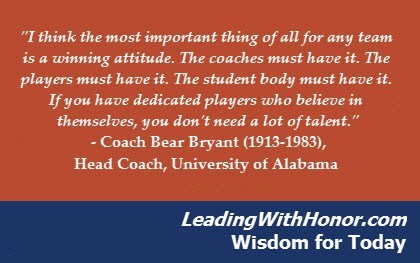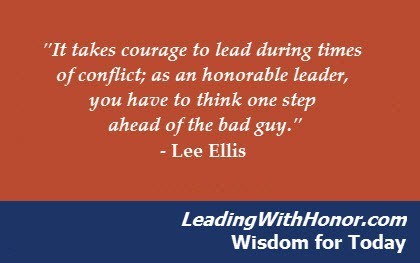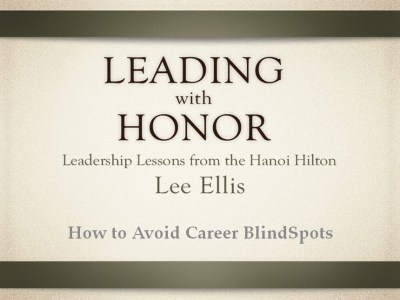Lee Ellis's Blog, page 330
August 16, 2014
It’s National Tell a Joke Day
Today is “National Tell a Joke Day” – we’re leading the charge and sharing a cartoon with you. Tell a joke to someone today, but make it a good one!


August 15, 2014
Lee Ellis/Leading with Honor – Wisdom for Today
August 14, 2014
“Don’t Get Mad: Get Even-Keeled” – How to Give/Receive Criticism That’ll Help You Grow as a Leader
Emotional fluctuations we experience in intimate relationships can often take similar form in the workplace. Criticisms are communicated as personal attacks, rather than concerns to be addressed. Daily irritations fuel disgust, sarcasm, and contempt. These situations result in defensiveness, dodging of responsibility, and a passive resistance that comes from feeling unfairly treated.
Harry Levinson, a psychoanalyst turned corporate consultant, offers the following advice on the art of the critique, which is heavily connected to the art of praise. Great article—get some nuggets of wisdom here –
Click here to read the article.
Related Articles:
4 Leadership Vitamins to Take for Low Emotional Intelligence
Freeing the Captives—How to Confront Your Personal Leadership Barriers


August 13, 2014
Teaching Teens to Lead – How Important Is It?
Teaching Teens to Lead—how important is it? Roughly 28% of recent college graduates are described as “deficient” with only a small fraction deemed highly skilled.
Leadership requires practice, but young people get few opportunities to do so. What can you do? Check out the article below, and share your thoughts -
Click here to read the article.
Related Articles:
Acceptance speech by actor Ashton Kutcher — Hear his Surprising Message
Leading with Honor—4 Ways to Have What It Takes


August 11, 2014
Two Frequently Asked Questions on Building and Maintaining Teams
Here’s a quick nugget of wisdom for your Monday—2 Frequently Asked Questions on Team-Building in Leadership –
Q: “What is the role of a leader in building a high-performance team?”
A: “A leader is crucial because he/she sets the tone, attitude, culture, and example of what is and is not okay. A self-aware leader must establish clarity and then hold people accountable in a healthy way.”
Q: “Once the team is established, how does the leader’s role change?”
A: “A this point, a leader’s role shifts more to developing the people, facilitating their growth technically in their field and also as a person.”
Please share these FAQs with others!


August 10, 2014
11 Things the Military Teaches You About Leadership
 Whether you’re a veteran or simply appreciate the values instilled in military personnel, here are “11 Things the Military Teaches You About Leadership” – good reminders for anyone wanting to grow and stretch what they apply as leaders.
Whether you’re a veteran or simply appreciate the values instilled in military personnel, here are “11 Things the Military Teaches You About Leadership” – good reminders for anyone wanting to grow and stretch what they apply as leaders.
Click to Read courtesy of CareerBuilder.
Which leadership item in this list do you appreciate the most? Please share!
Related Articles:
Six Ways to Avoid Career Blindspots
Freeing the Captives—How to Confront Your Personal Leadership Barriers


August 8, 2014
Leading with Honor – Wisdom for Today, August 8th
“I think the most important thing of all for any team is a winning #attitude. The coaches must have it. The players must have it. The student body must have it. If you have dedicated players who believe in themselves, you don’t need a lot of #talent.” – Coach Bear Bryant (1913-1983), Head Coach, University of Alabama


August 6, 2014
4 Leadership Vitamins to Take for Low Emotional Intelligence
By Lee Ellis
The commercials on television today talk endlessly about treatments for low this and low that, but unfortunately, we don’t hear much about low Emotional Intelligence (EQ). Here are some symptoms:
You know you’re brilliant, yet you find yourself reacting with impatience and anger with others who just don’t get it.
You’ve noticed that others don’t seem to get your humor or your jokes or don’t seem so interested in your great stories.
Maybe your feedback to a teammate failed to come across the way you had intended.
If as a leader at work, at home or in your community you have any of these symptoms, you’re possibly suffering from low Emotional Intelligence.
For most people, EQ limits a person’s career and influence more than IQ. So what are we talking about here? What indicates good emotional intelligence? It’s really about being aware of and responding effectively to emotions—our own and those of others.
In many ways, good EQ is similar to the common courtesies that were emphasized more in previous generations. After all, the old saw about “counting to ten” when we felt anger was about as scientific as you can get.
We now know that the emotional part of the brain (the Amygdala – /əˈmigdələ/) reacts four times faster than our cognitive quarterback in the pre-frontal cortex. In simpler terms, learning to slow down our response to emotional situations can keep us out of trouble.
The Amygdala is part of the limbic system and is the source of our natural protective response for flight or fight. For many who train regularly for combat – military, law enforcement, athletes—tapping into this source of high energy for a crisis response helps performance. But away from the job, that same response can get you in trouble—hence the term “Amygdala Hijack.” But to some degree, all of us use and misuse this natural instinct to fight or flee—to dominate or withdraw.
So, the key to good emotional intelligence is awareness. Until we become aware of our emotions and predict where they will take us, we’re clueless as to how to manage them; and that’s what we really want to do. Likewise, an awareness of the emotions of others helps us manage our response to facilitate the most effective interaction.
Two Tests and Four Steps
Like the nourishment of vitamins in our bodies, let’s digest the following four steps of emotional intelligence to get healthier as a leader –
1. Recognize your own emotions.
Awareness usually requires practice. You’re in a meeting and Bob says something that you know is absolutely wrong— “how could anyone be that stupid,” you think. Your first instinct is to call him out and show him how wrong he is. But you’ve been down that road before and know that will only embarrass Bob and ultimately make you look small. Besides, you may not even know all the facts that are behind his opinion. Fortunately, you recognize that you’re angry and you’ve learned to coach yourself to hold back on your response. You slow it down and engage your cognitive quarterback to come up with a plan B.
2. Manage your emotions.
You’re a quick thinker and now your mind is running through options for an effective way of responding. Your goal is to respond with honor and respect because that’s one of your personal values. You remind yourself that Bob is a bright guy, too. Also, you’ve heard from your leadership coach that listening is a really good tool. One option you remember that might work is to say something like, “Gee Bob, I had not thought of it like that before. Can you explain the logic of how that would work?” Of course, tone of voice and body language are very important to pulling this off because they are two of your strongest communicators of emotions. Once Bob gives his explanation, more than likely you will see that he’s not stupid at all—just operating with a different perspective. But in any case, you’ve managed your emotions and maintained your decorum—signs of a good EQ.
3. Recognize the emotions of others.
On the way back from the conference room, you run into Jane, one of your peers, who seems a bit down and overwhelmed. You’re depending on her to deliver the data that you need for the next step of your project and the deadline is tomorrow. Your immediate fear is that it’s not going to happen. Now that you’ve been working to raise your EQ, you mentally push back on your fear and consider what your teammate is up against and how her confidence and energy are sagging. It doesn’t take an EQ genius to realize that putting a guilt trip on her is probably not a good idea, but what can you do?
4. Respond appropriately/effectively to the emotions of others.
Because you’re not fear-motivated, you focus on encouraging Jane. After all, she does good work and what she needs right now is an emotional boost. So you choose to show her some empathy and encouragement, telling her that you understand things are difficult right now and asking if there are ways that you and your team can help. You also offer to listen to her challenges and brainstorm with her on solutions. (By the way, this is one of the most helpful things you can do for an extrovert; they unusually need to talk to think effectively.) You close out by reminding her that she is a great teammate and that you have confidence in her judgment.
The Silent Strength of EQ
Having good EQ may sound somewhat soft, but it’s actually very powerful because it’s about being the most effective we can be. It begins with awareness—we can’t manage what we don’t recognize—and then it’s about managing our own emotions and our response to others. In the simplest terms, it’s about reading the situation and then acting in the most effective manner. It does get easier with practice, and it makes you the kind of leader that others want to follow. Try it and see for yourself.
“Good leaders know who they are—their strengths, weaknesses, passions, talents, and values. And, developing leaders always starts with self-awareness.” – Lee Ellis
LE
Related Articles:
Six Way to Avoid Career Blindspots
—-
As president of Leadership Freedom® LLC, a leadership and team development consulting company, Lee Ellis consults with Fortune 500 senior executives in the areas of hiring, teambuilding, leadership and human performance development, and succession planning. Also a retired USAF Colonel, his latest book about his Vietnam POW experience is entitled Leading with Honor: Leadership Lessons from the Hanoi Hilton. Learn more at http://www.leadingwithhonor.com.


August 1, 2014
Lee Ellis – Wisdom for Today
“It takes #courage to lead during times of conflict; as an honorable #leader, you have to think one step ahead of the bad guy.” – Lee Ellis


July 31, 2014
Six Way to Avoid Career Blindspots
What’s the saying, “What you don’t know, you don’t know”?
Don’t be blind-sided by issues that can sidetrack your #career and #leadership path. Lee has created a brief slide presentation on Six Ways to Avoid Career Blindspots.
Please check it out and share it with others!















